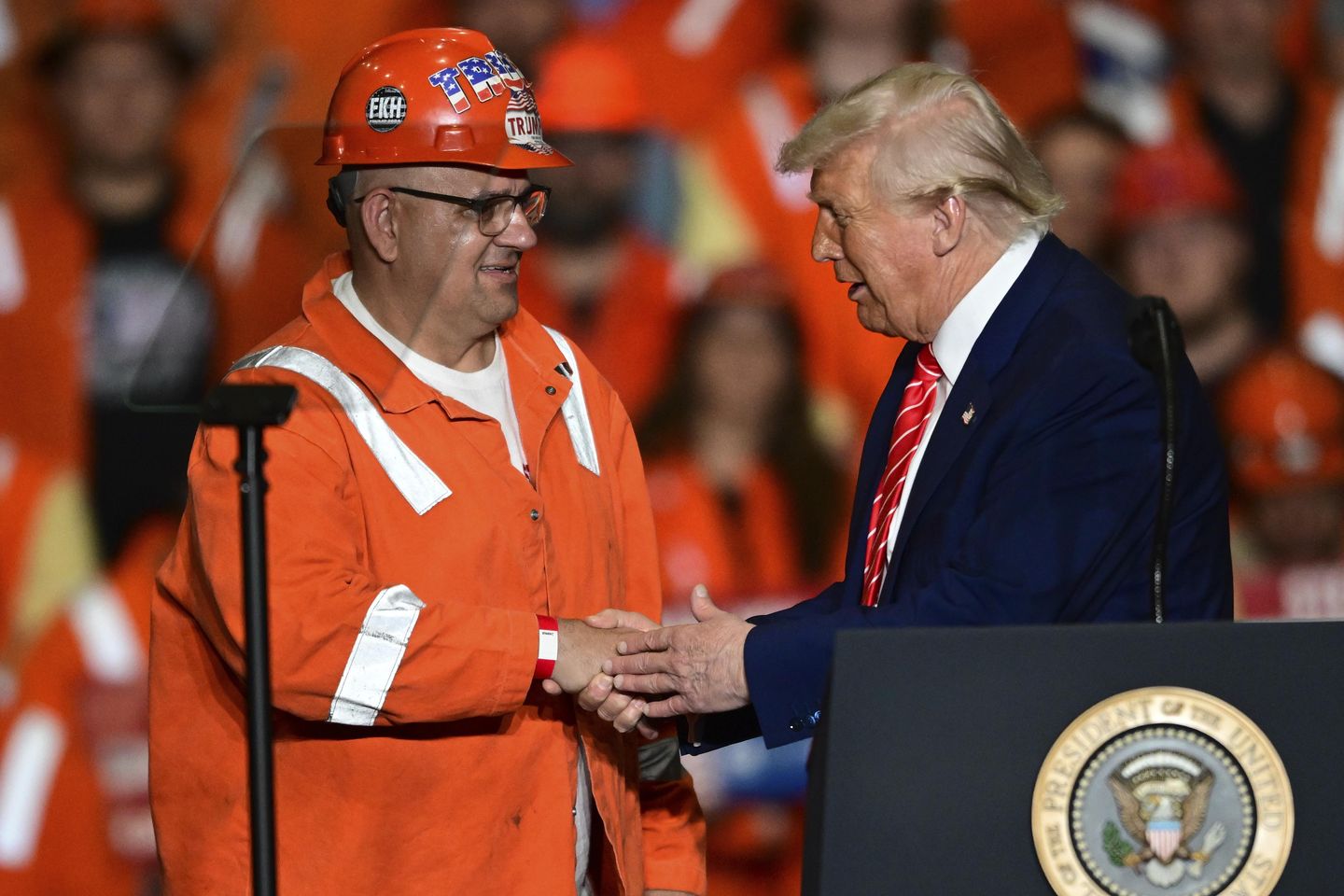
President Trump touted the partnership deal he helped broker between U.S. Steel and Japan’s Nippon Steel, saying the alliance will boost manufacturing and keep an iconic company under American ownership.
The president traveled Friday to a U.S. Steel mill in the Pittsburgh suburb of West Mifflin to clear the way for a deal that steelworkers said would save their jobs and provide jobs for the community for generations to come.
During his remarks, Mr. Trump also announced he was doubling his tariffs on steel imports to 50% from the initial 25% he imposed in March. The stringent tariff will make it harder for foreign steel producers to compete with American-made Steel.
“The name U.S. Steel was synonymous with greatness and now it will again be synonymous with greatness,” Mr. Trump said. “The best and strongest steel on earth will forever be made in America, made in Pennsylvania.”
While the crowd of steelworkers at the rally cheered the deal, their union leaders balked that it still represents an outright acquisition of U.S. Steel by a Japanese company — an outcome that both Mr. Trump and President Biden vowed to prevent.
In his remarks Friday, Mr. Trump brushed aside the detractors and hailed the partnership as a victory for the U.S. that will save more than 100,000 American jobs, including 14,000 jobs in Pennsylvania.
Concerns persist about Nippon’s purchase of a stake in U.S. Steel. The actual terms of the deal have yet to be disclosed.
It appears that Nippon will still purchase all outstanding shares of U.S. Steel for $55 per share, or roughly $12.5 billion, which were the terms of a deal first announced in December 2023. Mr. Trump said Nippon Steel will also invest $14 billion in U.S. Steel’s American operations.
However, it’s unclear how large of an ownership stake Nippon Steel will take by purchasing all of U.S. Steel’s outstanding shares. It appears large enough to give Nippon significant control of the company.
Mr. Biden and Mr. Trump opposed Nippon acquiring U.S. Steel, citing national security concerns because the company makes a product essential to U.S. security.
However, Mr. Trump relented because the current deal doesn’t give Nippon a full ownership stake.
It’s a point he emphasized at the steel mill.
“Most importantly, U.S. Steel will continue to be controlled by the U.S.A. Otherwise, I wouldn’t have done the deal,” Mr. Trump said.
United Steelworkers, the union representing U.S. Steel’s hourly workers in Pennsylvania and Indiana, said they believe the deal is a complete purchase by Nippon.
“The latest ’partnership’ announcement continues to raise more questions than answers,” the union said in a statement. “Nippon still maintains it would only invest in U.S. Steel facilities if it owned the company outright. We’ve seen nothing in the reporting to indicate that position has changed.”
Clark Packard, senior fellow in trade policy at the libertarian Cato Institute, said there “is not much of a difference” between Nippon’s 2023 proposal for an outright acquisition of U.S. Steel and the deal Mr. Trump touted Friday.
“I don’t think it’s a difference in reality,” he said. “It’s just a way for Trump to fly the patriotism flag and say I’m standing up for steel workers.”
Even if Nippon does own the shares, Mr. Trump said there will be some restrictions. For example, the U.S. government will hold what’s known as “golden shares” in U.S. Steel as a condition of approval. The golden shares allow the government to approve the majority of U.S. Steel’s board members, who will all be American, said Sen. David McCormick, Pennsylvania Republican.
“That will allow the United States to ensure that production levels aren’t cut,” he said earlier this week on CNBC.
If true, that would allow the federal government to hold a stake in U.S. Steel after the Nippon deal is completed. That would allow the government to control the affairs of a private company and give it a seat on the board of U.S. Steel.
“It’s pretty unprecedented,” Mr. Packard said. “The U.S. government doesn’t need to own a steel company. It doesn’t need to have a major position in a steel company, but this is the kind of wheeling and dealing Donald Trump likes. But if you prefer free markets, it makes you a little queasy.”
Other countries subsidize their steel production to reduce costs. Those subsidies allow countries such as China, Japan, Germany, Canada and Mexico to undercut U.S. steel prices and sell cheaper to Americans than domestically produced steel.
In 2021, half of the world’s top steel companies were state-owned, empowering them to sell their steel below the cost of production.








